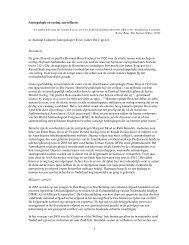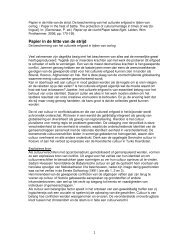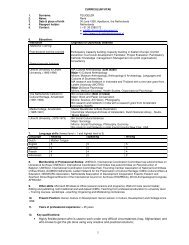The whole publication in PDF - Culture in Development
The whole publication in PDF - Culture in Development
The whole publication in PDF - Culture in Development
You also want an ePaper? Increase the reach of your titles
YUMPU automatically turns print PDFs into web optimized ePapers that Google loves.
Chapter 6 : Disaster Preparedness<br />
6.1 Introduction<br />
Disaster: it strikes anytime, anywhere. It takes many forms – a hurricane, an earthquake, a tornado, a flood, a fire<br />
or a hazardous spill, an act of nature or an act of terrorism. It builds up over days or weeks, or hits suddenly, without<br />
warn<strong>in</strong>g. Every year, millions of people face disaster, and its terrify<strong>in</strong>g consequences (Federal Emergency<br />
Management Agency FEM A website).<br />
It is believed that the number of natural disasters is <strong>in</strong>creas<strong>in</strong>g worldwide because o f climatic changes. Still,<br />
disasters fasc<strong>in</strong>ate people. <strong>The</strong>y <strong>in</strong>duce feel<strong>in</strong>gs of amazement and fear, and provide examples of courage, folly, and<br />
tragedy – <strong>in</strong> a sense, all the aspects of a great drama. Disasters are media events and frequently <strong>in</strong>spire Hollywood<br />
as most recently evidenced by the movies Twister, Dante’s Peak, and Volcano (Musser, 1997). But until you have<br />
experienced a disaster, it is hard to imag<strong>in</strong>e the sense of shock and helplessness they generate. It almost goes without<br />
say<strong>in</strong>g that we need to m<strong>in</strong>imise the damage caused by various types of disasters. Any archive should be prepared<br />
for the worst, be it located <strong>in</strong> the west, east, north or south. A disaster, or emergency, encompasses everyth<strong>in</strong>g from<br />
a forgotten open w<strong>in</strong>dow dur<strong>in</strong>g a ra<strong>in</strong>storm to a major earthquake, and everyth<strong>in</strong>g <strong>in</strong> between that puts the hold<strong>in</strong>gs<br />
<strong>in</strong> jeopardy (Tr<strong>in</strong>kaus-Randall, 1995).<br />
Disasters strike worldwide. This becomes very clear when read<strong>in</strong>g the tragic UNESCO report on the lost<br />
memory of the world (Hoeven et al., 1996). In the course of time every country is confronted with damage to their<br />
cultural heritage as a result of either wilful or accidental destruction. Local authorities and communities, especially<br />
those <strong>in</strong> tight economic circumstances, do not understand the benefits to be ga<strong>in</strong>ed of reduc<strong>in</strong>g losses today for an<br />
unknown tomorrow (Gavidia, 2001). Not surpris<strong>in</strong>gly develop<strong>in</strong>g countries are hit harder by disasters than countries<br />
with economic wealth. For the more we althy countries it is of course much easier to <strong>in</strong>vest <strong>in</strong> the prevention of<br />
potential risks.<br />
Disasters need to be managed <strong>in</strong> order to control them or at least to mitigate the effects. Accord<strong>in</strong>g to the<br />
Caribbean Disaster Emergency Response Agency (CDERA) the Disaster Management Cycle should address issues<br />
relevant to all phases of the disaster cycle: preparedness, response, recovery, rebuild<strong>in</strong>g, prevention, mitigation.<br />
Read<strong>in</strong>g about similar experiences of other <strong>in</strong>stitutions cannot only help to avoid mak<strong>in</strong>g the same mistake but can<br />
give an idea of what to expect after a disaster.<br />
Yet, it should be realised that each collection, each build<strong>in</strong>g, each situation is unique and that every <strong>in</strong>stitution<br />
has to prepare for disasters with its own unique plan.<br />
By and large, know<strong>in</strong>g ho w to react to a disaster is everyo ne’s responsibility, but especially for those with pub lic<br />
responsibility. Consequently, it should be the prime concern of any archivists to develop a way of prevent<strong>in</strong>g disaster<br />
and carry it out; even if it is not perfect, it can reduce the damage to his precious collections. Besides, thought and<br />
preparation will elim<strong>in</strong>ate panic and ensure that proper decisions w ill be made and carried out step-by-step. This<br />
is very important with objects made of paper whether they are framed or unframed works of art, documents, records,<br />
photographs or books. Nevertheless, the safety of the employees must come first before proceed<strong>in</strong>g to salvage any<br />
objects (Bishop Museum website). <strong>The</strong> Memory of the World Programme gives the follow<strong>in</strong>g general advice<br />
(Brandt-Grau, 2000):<br />
• be prepared for any type of disaster; contact and consult other <strong>in</strong>stitutions to share <strong>in</strong>formation and experience,<br />
and with a view to regional cooperation;<br />
• take advantage of educational sessions, particularly disaster plann<strong>in</strong>g workshops and preparedness exercises;<br />
• seek expert advice and help from the preservation offices of national <strong>in</strong>stitutions, members of stand<strong>in</strong>g<br />
committees, centres of professional organisations and their technical committees.<br />
Search<strong>in</strong>g for literature on disaster amounts to an overload of all k<strong>in</strong>ds of <strong>publication</strong>s, from a serious discourse to<br />
a bedside novel. It is best to be very critical and discrim<strong>in</strong>at<strong>in</strong>g. Many <strong>in</strong>stitutions safeguard<strong>in</strong>g their cultural heritage<br />
design and publish their own disaster preparedness plan. In most western countries plans are <strong>in</strong>tended to prevent fire<br />
and water calamities . In addition, m any regional and object-specific disaster plans app ear. However, roughly all<br />
plans relate to situations <strong>in</strong> non-tropical countries. Aga<strong>in</strong>, many books are available on natural disasters. Not much<br />
has appeared <strong>in</strong> pr<strong>in</strong>t on the effects of natural disasters, apart from floods, on archives, libraries or museums.<br />
Another omission is the literature on neglect. True, many books deal with issues of theft as it affects <strong>in</strong>stitutions<br />
guard<strong>in</strong>g cultural heritage, but very few dare to publish anyth<strong>in</strong>g on neglect as nobod y wants to wash their dirty l<strong>in</strong>en<br />
<strong>in</strong> public.<br />
Good, comprehensive, timely tools to answer disaster questions are few to non-existent. <strong>The</strong> <strong>in</strong>ternet, an endless<br />
source of <strong>in</strong>fo rmation, has b ecome o ne of the best reference too ls available for questions relat<strong>in</strong>g to disasters and<br />
the authors give an extensive list of relevant websites (Musser et al., 1997). However, it should be noted that the<br />
addresses on the <strong>in</strong>ternet change very often and are thus quickly outdated.<br />
Several bibliographies and databases are available on the <strong>in</strong>ternet, like the ones at the South-eastern Library<br />
Network (SOLINET) website, the International Strategy for Disaster Reduction (ISDR) website, the World Bank-<br />
DMF website, and the Natural Disaster Reference Database (NDRD) on the NASA -LTP website. Acco rd<strong>in</strong>g to<br />
Musser and Recupero (1997) disasters are also popular topics at the reference desk; check the websites of FEMA,<br />
US Geological Survey. <strong>The</strong> Natural Hazard Center <strong>in</strong> particular gives many more l<strong>in</strong>ks. <strong>The</strong> Virg<strong>in</strong>ia Cooperative<br />
Extension publishes an ‘After a Disaster’ Series on their website on Safety, Food and W ater, Cop<strong>in</strong>g with Stress,<br />
Clean<strong>in</strong>g, Insurance and Contracts, Landscape and Agriculture, Roof Repairs. Also check the websites of CoOL and<br />
Museum Security Network, a Dutch <strong>in</strong>itiative from T on Cremers.<br />
For older literature on disasters see the bibliography <strong>in</strong> Bucha nan, 19 88, for more recent literature see the<br />
bibliographies by Murray, 1994 and Henry, 1997. An early general title on disaster p reparedness for archives is<br />
Barton et al., 1985. Although written for North American conditions, it is an efficient and effective plann<strong>in</strong>g manual






